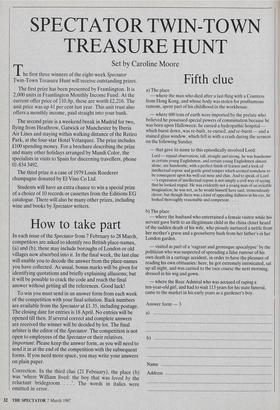SPECTATOR TWIN-TOWN TREASURE HUNT
Set by Caroline Moore
The first prize has been presented by Framlington. It is 2,000 units in Framlington Monthly Income Fund. At the current offer price of 110.8p, these are worth £2,216. The unit price was up 41 per cent last year. This unit trust also offers a monthly income, paid straight into your bank.
The second prize is a weekend break in Madrid for two, flying from Heathrow, Gatwick or Manchester by Iberia Air Lines and staying within walking distance of the Retiro Park, at the four-star Hotel Velazquez. The prize includes £100 spending money. For a brochure describing the prize and many other holidays arranged by Mundi Color, the specialists in visits to Spain for discerning travellers, phone 01-834 3492.
The third prize is a case of 1979 Louis Roederer champagne donated by El Vino Co Ltd.
Students will have an extra chance to win a special prize of a choice of 10 records or cassettes from the Editions EG catalogue. There will also be many other prizes, including wine and books by Spectator writers.
How to take part
In each issue of the Spectator from 7 February to 28 March, competitors are asked to identify two British place-names, (a) and (b); these may include boroughs of London or old villages now absorbed into it. In the final week, the last clue will enable you to decode the answer from the place-names you have collected. As usual, bonus marks will be given for identifying quotations and briefly explaining allusions; but it will be possible to crack the code and reach the final answer without getting all the references. Good luck!
To win you must send in an answer form from each week of the competition with your final solution. Back numbers are available from the Spectator at £1.35, including postage. The closing date for entries is 18 April. No entries will be opened till then. If several correct and complete answers are received the winner will be decided by lot. The final arbiter is the editor of the Spectator. The competition is not open to employees of the Spectator or their relatives. Important: Please keep the answer form, as you will need to send it in at the end of the competition with the subsequent forms. If you need more space, you may write your answers on plain paper.
Correction. In the third clue (21 February), the place (b) was 'where William lived: the boy that was loved by the reluctant bridegroom . . .'. The words in italics were omitted in error.
Fifth clue
a) The place — where the man who died after a last fling with a Countess from Hong Kong, and whose body was stolen for posthumous ransom, spent part of his childhood in the workhouse.
— where 600 tons of earth were imported by the prelate who believed he possessed special powers of commination because he was born upon HallOween: he cursed a hydropathic hospital which burnt down, was re-built, re-cursed, and re-burnt — and a stained glass window, which fell in with a crash during the sermon on the following Sunday.
— that gave its name to this episodically involved Lord: Lord— repaid observation; tall, straight and strong, he was handsome as certain young Englishmen, and certain young Englishmen almost alone, are handsonie; with a perfect finish of feature and a look of intellectual repose and gentle good temper which seemed somehow to be consequent upon his well-cut nose and chin. And to speak of Lord —'s expression of intellectual repose is not simply a civil way of saying that he looked stupid. He was evidently not a young man of an irritable imagination; he was not, as he would himself have said, tremendously clever; but though there was a kind of appealing dullness in his eye, he looked thoroughly reasonable and competent . . . .
b) The place — where the husband who entertained a female visitor while his servant gave birth to an illegitimate child in the china closet heard of the sudden death of his wife, who piously nurtured a nettle from her mother's grave and a gooseberry bush from her father's in her London garden.
— visited as part of a 'vagrant and grotesque apocalypse' by the politician who was suspected of spreading a false rumour of his own death in a carriage accident, in order to have the pleasure of reading his own obituaries: here, he got extremely intoxicated, sat up all night, and was carried to the race course the next morning, dressed in his wig and gown.
— where the Rear Admiral who was accused of raping a ten-year-old girl, and had to wait 113 years for his state funeral, came to the market in his early year as a gardener's boy.
Answer form — 3 Name Address


























































 Previous page
Previous page